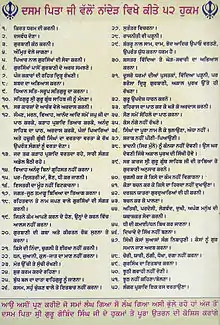The 52 Hukams of Guru Gobind Singh
The 52 Hukams are a set of instruction in Sikhism set by Guru Gobind Singh in Nanded, Maharashtra, India in 1708.[1][2] These edicts sum up the ideal way of life of the Khalsa and serve as a code of conduct for the Khalsa Panth. Members of the Khalsa (baptized Sikhs) aim to follow all the 52 edicts. The authenticity and origin of Hukams can be questioned and they seem to be made in more modern times as the style of Punjabi and the terms used are quite modern whereas Guru Gobind Singh's writings are mostly in Hindi, Braj bhasha, and Sanskrit. Some of them come from older writings such as Bhai Nand Lal's Tankanama.

| Part of a series on |
| Sikhism |
|---|
 |
1. Dharam dee kirat karnee – Make an honest living.
2. Dasvand denaa – Donate a tenth share of your earnings.
3. Gurbani kantth karnee – Learn Gurbani by heart.
4. Amrit Velā utthnaa – Arise during Amritvela (early morning).
5. Sikh sevak dee sevaa ruchee naal karnee – Devotedly serve the Sikh who serves others.
6. Gurbani de arth Sikh vidhvanaa tuo parrhnae – Study the essence of Gurbani from learned Sikhs.
7. Panj Kakaar dee rehit drirh kar rukhnee – Follow the discipline of The Five Ks strictly. Adhere resolutely to the five articles of faith.
8. Shabad da abhiaas karnaa – Practice the sacred hymns to life.
9. Sat Saroop Satgur daa dhian dharnaa – Contemplate and assimilate the beautiful truth of the True Enlightener.
10. Guru Granth Sahib Jee noo Guru mananaa – Believe in and accept Shri Guru Granth Sahib Ji as the Guide to enlightenment.
11. Kaarjaan dae arambh vich ardaas karnee – When undertaking any task, first perform the prayer of Ardās.
12. Jaman, maran, ja viah mokae jup da paatth kar tihaaval (Karaah Parsaad) kar anand sahib dia punj paurian, ardaas, pratham panj pyaariaan atae hazooree granthee noo vartaa kae oprunth sangat noo vartaaouna – For birth naming, funeral, or marriage ceremonies or devotional reading paath, recite Japji Sahib while making Karah Parshad, perform five verses of Anand Sahib, and ardaas, and then distribute Karah Prashad to the Panj Pyare, attending Granthi, and then to the sangat gathered for worship.
13. Jad tak Karaah Parshaad vartadaa rahae sadh sangat addol batthee rahae – Until Karaah Parshaad has been served to everyone, the congregation ought to be still and remain seated.
14. Anand viah binaa grahist nahee karnaa – Without Anand marriage ceremony carnal relations should not occur.
15. Par istree, ma bhain, dhee bhain, kar jaananee. Par istree da sang nahee karnaa – Other than your wedded wife, consider all women as your mothers and sisters. Do not indulge in carnal marital relationships with them.
16. Istree da mooh nahee phitkaarnaa – Do not subject your wife to cursing, or verbal abuse.
17. Jagat jootth tambaakoo bikhiaa da tiaag karnaa – Discard worldly ways, falsehoods, and poisonous tobacco.
18. Rehitvaan atae naam jupan vaalae gursikhaa dee sangat karnee – Make companions of Gursikhs who follow the Rehit and recite the Divine Name.
19. Kum karan vich daridar nahee karnaa – Work hard and don’t be lazy.
20. Gurbanee dee kathaa tae keertan roaz sunanaa atae karnaa – Take part in listening to Kirtan and discussions of the essence of Gurbani every day.
21. Kisae dee ninda, chugalee, atae eirkhaa nahee karnee – Do not gossip nor slander, or be spiteful to anyone.
22. Dhan, javaanee, tae kul jaat da abhiman naee karnaa (Nanak daadak tahe duae goath. Saak guroo Sikhan sang hoath) – Do not be proud of riches, youthfulness or lineage. (Regardless of maternal and paternal caste or heritage, all of the Guru’s Sikhs are siblings of one family.)
23. Mat uchee tae suchee rakhnee – Maintain a high standard of purity in religious discipline.
24. Shubh karman tao kadae naa ttarnaa – Do not avoid performing virtuous acts.
25. Budh bal da daataa vaheguroo noo jaananaa – Appreciate intellect and power as gifts of the all knowing wondrous Enlightener.
26. Sugandh (kasam sahu) dae kar itbaar janaaoun vaalae tae yakeen nahee karnaa – Have no faith in oaths sworn by one attempting to convince another of sincerity.
27. Sutantar vicharna. Raaj Kaaj dian kamaan tae doosrae mutaa dia purshaan noo huk nahee daenaa – Maintain independent rule. In the affairs of governing, do not give the power of religious authority to those of other faiths.
28. Raajnitee parhnee – Study and learn about governmental policies.
29. Dushman naal saam, daam, bhaed, aadiak, upaa vartnae ate uprant udh karnaa – When dealing with enemies, practice diplomacy, employ a variety of tactics, and exhaust all techniques before engaging in warfare.
30. Shaster vidyaa atae ghorhae di savaari da abhiaas karnaa – Train in the skills of weaponry and horsemanship.
31. Doosrae mataa dae pustak, vidyaa parhnee. Pur bhrosaa drirh Gurbanee, Akaal Purakh tae karnaa| – Study the books and beliefs of other faiths. But maintain trust in Gurbani and Akal Purakh [Undying divine personification].
32. Guroopdaesaa noo dhaaran karnaa – Follow the Guru teachings.
33. Raheraas da paath kar kharae ho kae ardaas karnee – After reciting Rehras [evening prayers], stand up and perform Ardās.
34. Saun valae sohilaa atae ‘paun guru pani pita…’ salok parhnaa – Recite the late evening prayer Sohila and the verse “Pavan guru pani pita…” before sleeping.
35. Dastaar binaa nahee rehnaa – Never be without the turban, wear it always.
36. Singhaa da adhaa naam nahee bulaunaa – Address a Singh by their entire name including Singh [or Kaur], do not shorten it by half or call them nicknames.
37. Sharaab nai saevanee – Do not indulge in drinking alcoholic beverages.
38. Sir munae noo kanaiaa nahee daenee. Uos ghar daeve jithae Akal Purukh dee sikhee ha, jo karza-ai naa hovae, bhalae subhaa da hovae, bibaekee atae gyanvaan hovae – Do not given a daughter’s hand in marriage to a shaven one. Give her to a household where the Undying divine personification Akal purakh and tenets of Sikhism are respected, to household without debt, of a pleasing nature, which is disciplined and educated.
39. Subh kaaraj Gurbanee anusaar karnae – Maintain all business affairs in accordance with scripture.
40. Chugalee kar kisae da kam nahee vigaarnaa – Do not cause ruin by gossiping about other’s business.
41. Kaurha bachan nahee kahinaa – Do not speak in bitterness.
42. Darshan yaatraa gurdwaaraa dee hee karnee – Make pilgrimages only for seeing Gurdwaras.
43. Bachan karkae paalnaa – Keep all promises made.
44. Pardaesee, lorvaan, dukhee, apung manukh dee yataahshkat seva karnee – Do as much possible to serve and aid foreigners, those in need, or in trouble.
45. Putaree da dhan bikh jananaa – Realize that considering a daughter as property is as poison.
46. Dikhaavae da Sikh nahee banana – Do not act a Sikh outwardly only for show.
47. Sikhi kesaa-suaasa sang nibhaaounee – Live and die a Sikh with hair intact and unshorn.
48. Chori, yaari, tthugi, dhokaa, dagaa bahee karnaa – Abstain from thievery, adultery, cheating, deception, swindling and pillaging.
49. Sikh da itbaar karnaa – Have confidence in a Sikh.
50. Jhutthi gavaahee nahee daenee – Do not make false statements.
51. Dhroh nahee karnaa – Do not participate in fraud.
52. Langar Parshaad ik ras vartaaunaa – Serve Langar (Sikhism) and prashad with impartiality.
References
- Singh, Balawindara (2004). Fifty-Two Commandments Of Guru Gobind Singh. Michigan, US: Singh Bros. p. 9.
- Singh, Satbir (1991). Aad Sikh Te Aad Sakhian. Jalandhar: New Book Company.